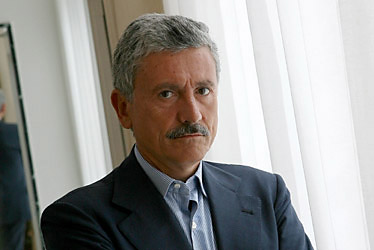Italia: Filling the Peacekeeping Vacuum

NICK CORNISH FOR TIME
Italian Foreign Minister Massimo D’Alema
Posted Saturday, Aug. 26, 2006
10 Questions: In the wake of its commitment to take the lead in building a strong international force in Lebanon, Italian Foreign Minister Massimo D’Alema talks to TIME about democracy, Hizballah’s future and a certain “indispensable nation” (=US)
Italian Foreign Minister Massimo D’Alema is the epitome of the “Old Europe” once mocked by U.S. Secretary of Defense Donald Rumsfeld. But Italy’s commitment last week to provide 3,000 troops became the key to forging a strong European-led U.N. peace-keeping force in Lebanon. France initially offered just 200 troops, in addition to those it already has in Lebanon, before upping its pledge to 2,000. D’Alema, 57, spoke with TIME’s Jeff Israely about democracy in Lebanon, Hizballah’s future, and a certain “indispensable nation.”
A week ago, Europe appeared on the verge of going AWOL in a moment of need. When did you realize Italy had to take the lead on Lebanon?
We’ve held a consistent position that the solution had to pass through the international community, involve the Arab world, and that Europe had to take the principal leadership role. We had strong support from the U.S., which was a precondition for succeeding. And with the support of other countries, like Germany and the U.K., it was difficult for [French President Jacques] Chirac to maintain his position [on troop numbers].
What is the mandate of the U.N. force heading into Lebanon?
The Arab world is at a crossroads, with democratic impulses facing off with a violent religious fundamentalism. We want the democratic forces to prevail. So this U.N. force is there to strengthen the Lebanese government.
What does this mean for Hizballah?
Our objective is not to destroy Hizballah, which by now is an important part of Lebanese society. We hope Hizballah transforms into a legitimate political movement, but now if it wants to resume hostilities, it knows that it must face the international community.
Isn’t there the risk, as we’ve seen in the Palestinian territories, that the democratic process can also open the gates to fundamentalists?
This risk certainly exists, but there is no alternative to democracy.
Many Israelis are still suspicious of Europe. How do you allay their concerns?
I fully comprehend the psychology of the Israelis, who feel under siege. They are surrounded by hostile countries, openly espousing Israel’s destruction. Why are we sending our soldiers to Lebanon? It is because we want to help guarantee Israel’s security. They must realize that Europe is their friend.
Was the recent conflict in Lebanon a lesson for Israel?
Israel had a knee-jerk reaction, rather than a specific strategy. You need to have clear ends in mind. The nature of the conflict has changed. It is not just an Israeli-Arab conflict. There is the risk that Israel will be seen as the first hostile outpost of the West, and in the epoch of the clash of civilizations, this is very dangerous.
Iran is a top trading partner with Italy. Would you be opposed to sanctions if they do not abide by U.N. resolutions?
We’re all united in saying that Iran should not acquire nuclear weapons, and we have to exercise very strong pressure against them. But we must make sure the international community is united. If not, the risk is that you strengthen Iran.
What do you see when you look back five years after Sept. 11?
You have to begin by asking what is this challenge of Islamic terrorism? If it’s seen as a challenge against the West, we are in trouble. If it is seen as a threat to humanity, we will find the right response. Even before being our enemies, this terrorism is the enemy of their own people.
Since becoming foreign minister, you have forged close ties with U.S. Secretary of State Condoleezza Rice. Was this hard after being a harsh critic of US foreign policy?
I agree with [former U.S. Secretary of State] Madeleine Albright’s line that America is the “indispensable nation.” You need the U.S. in order to resolve the world’s problems. You can’t even remedy the United States’ own errors without the United States.
Was there any difficulty negotiating with the French after Italy’s victory over France in the World Cup final?
(Chuckles) I don’t think that was it. The French can take anything, but when they saw Italy overtaking it on Lebanon policy, they couldn’t let that stand. They’ve got a strong dose of national pride.

Recent Comments